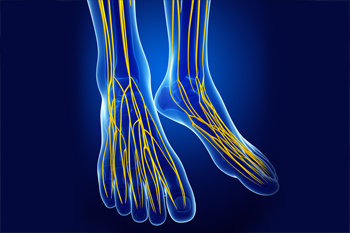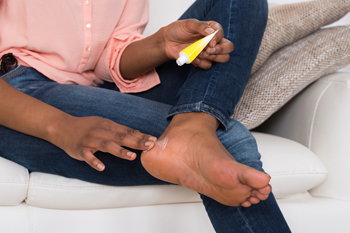Items filtered by date: September 2021
Do Your Child's Feet Hurt?
What Is Diabetic Peripheral Neuropathy?
People with diabetes are at an increased risk of neuropathy, or nerve damage. Diabetics are frequently diagnosed with peripheral neuropathy, or nerve damage in the hands and feet. Symptoms of peripheral neuropathy in the lower limbs include tingling, pins and needles, numbness, pain, or increased sensitivity in the feet. In some cases, the feet may change shape due to nerve damage. Sores and diabetic foot ulcers, which can be difficult to detect and tend to heal slowly and poorly, are also very common. If you have diabetes, it is important to be vigilant of any foot or ankle symptoms. Seeing a podiatrist regularly can help manage existing symptoms, detect and treat any new problems, and maintain the health of your feet.
Neuropathy
Neuropathy can be a potentially serious condition, especially if it is left undiagnosed. If you have any concerns that you may be experiencing nerve loss in your feet, consult with Nrup Tolat, DPM from Atlanta Total Foot & Ankle Care. Our doctor will assess your condition and provide you with quality foot and ankle treatment for neuropathy.
What Is Neuropathy?
Neuropathy is a condition that leads to damage to the nerves in the body. Peripheral neuropathy, or neuropathy that affects your peripheral nervous system, usually occurs in the feet. Neuropathy can be triggered by a number of different causes. Such causes include diabetes, infections, cancers, disorders, and toxic substances.
Symptoms of Neuropathy Include:
- Numbness
- Sensation loss
- Prickling and tingling sensations
- Throbbing, freezing, burning pains
- Muscle weakness
Those with diabetes are at serious risk due to being unable to feel an ulcer on their feet. Diabetics usually also suffer from poor blood circulation. This can lead to the wound not healing, infections occurring, and the limb may have to be amputated.
Treatment
To treat neuropathy in the foot, podiatrists will first diagnose the cause of the neuropathy. Figuring out the underlying cause of the neuropathy will allow the podiatrist to prescribe the best treatment, whether it be caused by diabetes, toxic substance exposure, infection, etc. If the nerve has not died, then it’s possible that sensation may be able to return to the foot.
Pain medication may be issued for pain. Electrical nerve stimulation can be used to stimulate nerves. If the neuropathy is caused from pressure on the nerves, then surgery may be necessary.
If you have any questions, please feel free to contact our offices located in Woodstock and Atlanta, GA . We offer the newest diagnostic and treatment technologies for all your foot care needs.
What Can Cause Heel Pain?
 Heel pain can be debilitating for some patients, and can arise due to a variety of different causes. The three most common sources of heel pain are plantar fasciitis, Achilles tendonitis, and arthritis. Plantar fasciitis occurs when the plantar fascia, which is a band of tissue that runs along the bottom of the foot connecting the heel to the toes, becomes inflamed or torn. Achilles tendonitis is the result of the Achilles tendon, which connects the calf muscles to the heel bone, becoming inflamed. Other common causes of heel pain can include bursitis, stress fractures, or the wearing down of the heel pad at the bottom of the heel. If you are struggling with heel pain, consulting with a podiatrist for a proper diagnosis and treatment can be incredibly beneficial.
Heel pain can be debilitating for some patients, and can arise due to a variety of different causes. The three most common sources of heel pain are plantar fasciitis, Achilles tendonitis, and arthritis. Plantar fasciitis occurs when the plantar fascia, which is a band of tissue that runs along the bottom of the foot connecting the heel to the toes, becomes inflamed or torn. Achilles tendonitis is the result of the Achilles tendon, which connects the calf muscles to the heel bone, becoming inflamed. Other common causes of heel pain can include bursitis, stress fractures, or the wearing down of the heel pad at the bottom of the heel. If you are struggling with heel pain, consulting with a podiatrist for a proper diagnosis and treatment can be incredibly beneficial.
Many people suffer from bouts of heel pain. For more information, contact Nrup Tolat, DPM of Atlanta Total Foot & Ankle Care. Our doctor can provide the care you need to keep you pain-free and on your feet.
Causes of Heel Pain
Heel pain is often associated with plantar fasciitis. The plantar fascia is a band of tissues that extends along the bottom of the foot. A rip or tear in this ligament can cause inflammation of the tissue.
Achilles tendonitis is another cause of heel pain. Inflammation of the Achilles tendon will cause pain from fractures and muscle tearing. Lack of flexibility is also another symptom.
Heel spurs are another cause of pain. When the tissues of the plantar fascia undergo a great deal of stress, it can lead to ligament separation from the heel bone, causing heel spurs.
Why Might Heel Pain Occur?
- Wearing ill-fitting shoes
- Wearing non-supportive shoes
- Weight change
- Excessive running
Treatments
Heel pain should be treated as soon as possible for immediate results. Keeping your feet in a stress-free environment will help. If you suffer from Achilles tendonitis or plantar fasciitis, applying ice will reduce the swelling. Stretching before an exercise like running will help the muscles. Using all these tips will help make heel pain a condition of the past.
If you have any questions please contact our offices located in Woodstock and Atlanta, GA . We offer the newest diagnostic and treatment technologies for all your foot and ankle needs.
Tarsal Tunnel Syndrome Causes
The tarsal tunnel is a narrow space in the inner ankle that has nerves, blood vessels, and tendons passing through it. When the posterior tibial nerve inside of the tarsal tunnel is compressed, this leads to a painful condition called tarsal tunnel syndrome. Symptoms of this condition include foot pain, a pins and needles sensation, numbness, and swelling. The nerve compression that brings about tarsal tunnel syndrome can be caused by sports injuries, lesions, such as ganglion cysts, that occupy space in the tunnel, excess fluid buildup, changes in the biomechanics of the foot, wearing tight, ill-fitting shoes, or other medical conditions like diabetes and arthritis. In about 30% of cases, the cause is unknown. Nevertheless, tarsal tunnel syndrome can be treated and usually resolves within several weeks of treatment. If you have symptoms of this condition, please seek the care of a podiatrist.
Tarsal tunnel syndrome can be very uncomfortable to live with. If you are experiencing tarsal tunnel syndrome, contact Nrup Tolat, DPM of Atlanta Total Foot & Ankle Care. Our doctor can provide the care you need to keep you pain-free and on your feet.
Tarsal Tunnel Syndrome
Tarsal tunnel syndrome, which can also be called tibial nerve dysfunction, is an uncommon condition of misfiring peripheral nerves in the foot. The tibial nerve is the peripheral nerve in the leg responsible for sensation and movement of the foot and calf muscles. In tarsal tunnel syndrome, the tibial nerve is damaged, causing problems with movement and feeling in the foot of the affected leg.
Common Cause of Tarsal Tunnel Syndrome
- Involves pressure or an injury, direct pressure on the tibial nerve for an extended period of time, sometimes caused by other body structures close by or near the knee.
- Diseases that damage nerves, including diabetes, may cause tarsal tunnel syndrome.
- At times, tarsal tunnel syndrome can appear without an obvious cause in some cases.
The Effects of Tarsal Tunnel Syndrome
- Different sensations, an afflicted person may experience pain, tingling, burning or other unusual sensations in the foot of the affected leg.
- The foot muscles, toes and ankle become weaker, and curling your toes or flexing your foot can become difficult.
- If condition worsens, infections and ulcers may develop on the foot that is experiencing the syndrome.
A physical exam of the leg can help identify the presence of tarsal tunnel syndrome. Medical tests, such as a nerve biopsy, are also used to diagnose the condition. Patients may receive physical therapy and prescriptive medication. In extreme cases, some may require surgery.
If you have any questions please feel free to contact our offices located in Woodstock and Atlanta, GA . We offer the newest diagnostic and treatment technologies for all your foot and ankle needs.
Foot Care for Dry, Cracked Heels
Dry, cracked heels can be annoying to deal with on a daily basis. They can even be painful when left untreated. Cracked heels are often caused by a lack of moisture and this can result from cold winter weather, dehydration, exposing your feet to hot water for prolonged periods of time, or scrubbing your feet while they are dry. Certain skin conditions, such as eczema and psoriasis, can also make the heels very dry. Having a good foot care regiment at home can help alleviate dry, cracked heels. Your foot care routine may include soaking the feet in warm water, exfoliating the heels with a pumice stone, thoroughly drying your feet with a towel, and then applying a heavy moisturizing cream. If the cracks on your heels become so deep that they bleed, these are known as fissures and can lead to an infection. When your cracked heels are painful, bleeding, or if you have diabetes, it is strongly suggested that you see a podiatrist for treatment.
Cracked heels are unsightly and can cause further damage to your shoes and feet. If you have any concerns, contact Nrup Tolat, DPM from Atlanta Total Foot & Ankle Care. Our doctor can provide the care you need to keep you pain-free and on your feet.
Cracked Heels
Cracked heels appear unappealing and can make it harder for you walk around in sandals. Aside from looking unpleasant, cracked heels can also tear stockings, socks, and wear out your shoes. There are several methods to help restore a cracked heel and prevent further damage.
How Do You Get Them?
Dry skin is the number one culprit in creating cracked heels. Many athletes, walkers, joggers, and even swimmers suffer from cracked heels. Age and skin oil production play a role to getting cracked heels as well.
Promote Healing
Over the counter medicines can help, especially for those that need instant relief or who suffer from chronic dry feet.
Wear Socks – Wearing socks with medicated creams helps lock in moisture.
Moisturizers – Applying both day and night will help alleviate dryness which causes cracking.
Pumice Stones – These exfoliate and remove dead skin, which allows for smoother moisturizer application and better absorption into the skin.
Change in Diet
Eating healthy with a well-balanced diet will give the skin a fresh and radiant look. Your body responds to the kinds of food you ingest. Omega-3 fatty acids and zinc supplements can also revitalize skin tissue.
Most importantly, seek professional help if unsure how to proceed in treating cracked heels. A podiatrist will help you with any questions or information needed.
If you have any questions, please feel free to contact our offices located in Woodstock and Atlanta, GA . We offer the newest diagnostic and treatment technologies for all your foot care needs.




